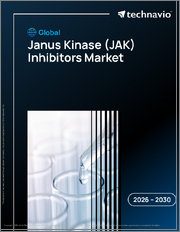
|
시장보고서
상품코드
1539241
MCL1 저해제 시장 : 임상시험과 상업화 기회(2024년)MCL1 Inhibitor Drug Clinical Trials & Commercialization Opportunity Insights 2024 |
||||||
MCL1 저해제는 암 치료의 유망하고 도전적인 분야로, 의약품 개발의 새로운 기회로 큰 잠재력을 가지고 있습니다. 승인된 MCL1 저해제가 없고 최고 단계의 개발이 임상 2상 단계에 머물러 있음에도 불구하고, MCL1 저해제는 제약회사와 연구자들의 큰 관심을 받고 있습니다. 이러한 관심은 MCL1이 암세포의 생존에 중요한 역할을 하고 기존 치료제에 대한 내성을 극복할 수 있는 표적으로서의 잠재력 때문인 것으로 분석됩니다.
MCL1(myeloid cell leukemia 1)은 B세포 백혈병/림프종-2(BCL-2) 단백질 계열에 속하는 중요한 항아폽토시스 단백질입니다. MCL1은 다양한 암종에서 세포의 생존과 세포사멸에 대한 저항성을 촉진하는 매우 중요한 역할을 하므로 암 치료의 매력적인 표적으로 떠오르고 있으며, 혈액암과 고형암에서 자주 과발현되어 암세포의 생존과 증식에 기여하고 기존 치료법에 대한 저항성을 유발합니다. 암세포의 생존과 증식 및 기존 치료제에 대한 저항성에 기여합니다. 이처럼 암 생물학에 광범위하게 관여하는 MCL1은 여러 암 적응증에 광범위하게 적용될 수 있는 치료 전략으로서의 가능성을 강조하고 있습니다.
MCL1을 특이적으로 표적으로 하는 저분자 억제제 개발은 이 분야의 주요 관심사입니다. 이러한 노력은 MCL1과 세포자멸사 결합 파트너 간의 단백질 간 상호작용을 파괴하여 암세포 사멸을 유도하는 것을 목표로 하고 있습니다. 여러 제약회사와 학술기관이 역가, 선택성, 약동학적 특성을 개선한 저분자 MCL1 저해제의 개발 및 최적화를 위해 적극적으로 노력하고 있습니다.
MCL1 저해제 시장 개발은 여러 요인에 의해 큰 잠재력을 가지고 있으며, MCL1 과발현이 관찰되는 많은 암종에 걸쳐 큰 잠재적 시장이 존재하고, 여러 적응증에 걸쳐 중요한 환자군을 형성하고 있습니다. 또한 많은 암이 기존 치료제에 내성을 보이는 경우가 많아 이러한 내성 메커니즘을 극복할 수 있는 새로운 치료 옵션에 대한 수요가 발생하고 있으며, 미충족 의료 수요도 분명합니다.
MCL1 저해제는 다른 표적치료제, 화학요법, 면역요법과의 병용투여가 유망하여 그 응용 가능성과 시장가치를 확대할 수 있습니다. 특히 먼저 출시되는 화합물이 큰 시장 점유율을 차지하여 이 분야에서 확고한 입지를 구축할 수 있으므로 오리지널 의약품으로서의 우월성은 매우 매력적입니다. 또한 새로운 MCL1 저해제나 MCL1을 타깃으로 하는 혁신적인 접근법은 강력한 특허 보호와 독점권을 확보할 수 있는 기회가 있습니다.
세계의 MCL1 저해제 시장에 대해 조사했으며, 시장의 개요와 약제 동향, 임상시험 동향, 지역별 동향 및 시장에 참여하는 기업의 경쟁 구도 등을 제공하고 있습니다.
목차
제1장 조사 방법
제2장 MCL1 저해제의 서론
제3장 MCL1 저해제 - 작용기서
- MCL1 간접 저해
- MCL1 직접 저해
제4장 MCL1의 역할과 적응증별 임상 혁신
- 조혈 악성 종양
- 백혈병
- 림프종
- 다발성골수종
- 고형 암
- 유방암
- 폐암
- 악성 흑색종
- 대장암
- 바이러스 감염
제5장 세계의 MCL1 저해제 시장의 기회 전망
- 현재 임상 조사의 상황
- 향후 상업화 기회
제6장 세계의 MCL1 저해제 임상시험 개요
- 기업별
- 국가별
- 적응증별
- 환자 부문별
- 상별
제7장 MCL1 저해제 임상시험에 관한 기업, 국가, 적응증, 상별 인사이트
- 전임상
- 제I상
- 제I/II상
- 제II상
제8장 경쟁 구도
- Abbvie
- Amgen
- Anji Pharma
- Ascentage Pharma
- Broad Institute
- Cyclacel Pharmaceuticals
- Gilead Sciences
- Novartis
- Servier
- Sirnaomics
MCL1 Inhibitor Drug Clinical Trials & Commercialization Opportunity Insights 2024 Report Highlights:
- Research Methodology
- ML1 Inhibitor Drug In Clinical Trials: > 10 Drugs
- MCL1 Inhibitor Drug Clinical Trials Insight By Company, Indication and Phase
- Global MCL1 Inhibitor Drug Market Opportunity Outlook
- Role of MCL1 & Clinical Innovation by Indications
- Competitive Landscape
MCL1 inhibitors represent a promising yet challenging frontier in cancer therapeutics, with significant potential as an emerging opportunity for drug development. Despite the absence of approved MCL1 inhibitors and the highest stage of development being phase 2 clinical trials, the MCL1 inhibitors continues to attract substantial interest from pharmaceutical companies and researchers alike. This interest is driven by the critical role MCL1 plays in cancer cell survival and its potential as a target for overcoming resistance to existing therapies.
MCL1 (myeloid cell leukemia 1) is a critical anti-apoptotic protein belonging to the B-cell leukemia/lymphoma-2 (BCL-2) protein family. It has emerged as an attractive target for cancer therapy due to its pivotal role in promoting cell survival and resistance to apoptosis in various cancer types. MCL1 is frequently overexpressed in hematologic malignancies and solid tumors, contributing to cancer cell survival proliferation, and resistance to conventional therapies. This widespread involvement in cancer biology underscores the potential of MCL1 inhibition as a therapeutic strategy with broad applications across multiple cancer indications.
The development of small molecule inhibitors specifically targeting MCL1 has been a primary focus in this field. These efforts aim to disrupt the protein-protein interactions between MCL1 and its pro-apoptotic binding partners, thereby triggering cancer cell death. Several pharmaceutical companies and academic institutions are actively engaged in developing and optimizing small molecule MCL1 inhibitors with improved potency, selectivity and pharmacokinetic properties.
While direct MCL1 inhibitors are under development, alternative approaches to targeting MCL1 have also gained traction. One such strategy involves the use of cyclin-dependent kinase (CDK) inhibitors, particularly CDK9 or CDK7, which indirectly suppresses MCL1 expression by interfering with its transcription. This approach leverages the short half-life of MCL1 protein, rapidly depleting cellular MCL1 levels and potentially overcoming some of the challenges associated with direct inhibition. An example of this is Cyclacel Pharmaceuticals' Seliciclib, a CDK inhibitor, which also lowers the levels of MCL1 in the cell.
Another avenue being explored is the use of BCL-2 inhibitors that demonstrate activity against MCL1. This primarily involves the development of inhibitors targeting the BH3 binding domain, which is found on both BCL-2 and MCL1. While these compounds may lack the selectivity of dedicated MCL1 inhibitors, they offer the potential advantage of simultaneously targeting multiple anti-apoptotic proteins, potentially leading to more robust anti-cancer effects.
The market opportunity for MCL1 inhibitor development is substantial, driven by several factors. The large potential market, spanning numerous cancer types where MCL1 overexpression is observed, presents a significant patient population across multiple indications. There is also a clear unmet medical need, as many cancers develop resistance to existing therapies, creating a demand for novel treatment options that can overcome these resistance mechanisms.
MCL1 inhibitors show promise in combination with other targeted therapies, chemotherapies, and immunotherapies, expanding their potential applications and market value. The first-to-market advantage is particularly compelling, as the first successful compound to reach the market could capture significant market share and establish a strong position in the field. Additionally, novel MCL1 inhibitors and innovative approaches to MCL1 targeting present opportunities for robust patent protection and exclusivity.
Additionally, emerging research suggests potential applications for MCL1 inhibitors beyond oncology, such as in antiviral treatments, potentially broadening the market scope. This expansion into other therapeutic areas could significant increase the commercial potential of MCL1 inhibitors.
In conclusion, while the development of MCL1 inhibitors faces challenges, including potential off-target toxicities and the need for careful patient selection, the market opportunity remains compelling. The combination of a large potential market, significant unmet medical need, and the possibility of first-mover advantage makes MCL1 inhibition an attractive area for pharmaceutical investment and innovation in the coming years.
Table of Contents
1. Research Methodology
2. Introduction To MCL1 Inhibitors
- 2.1 MCL1 As A Therapeutic Target
- 2.2 Role of MCL1 in Cancer
3. MCL1 Inhibitors - Mechanism of Action
- 3.1 Indirect Inhibition of MCL1
- 3.2 Direct Inhibition of MCL1
4. Role of MCL1 & Clinical Innovation by Indication
- 4.1 Hematological Malignancies
- 4.1.1 Leukemia
- 4.1.2 Lymphoma
- 4.1.3 Multiple Myeloma
- 4.2 Solid Cancers
- 4.2.1 Breast cancer
- 4.2.2 Lung Cancer
- 4.2.3 Melanoma
- 4.2.4 Colorectal cancer
- 4.3 Viral Infections
5. Global MCL1 Inhibitor Drug Market Opportunity Outlook
- 5.1 Current Clinical Research Landscape
- 5.2 Future Commercialization Opportunities
6. Global MCL1 Inhibitor Drugs Clinical Trials Overview
- 6.1 By Company
- 6.2 By Country
- 6.3 By Indication
- 6.4 By Patient Segment
- 6.5 By Phase
7. MCL1 Inhibitors Clinical Trials Insight By Company, Country, Indication & Phase
- 7.1 Preclinical
- 7.2 Phase I
- 7.3 Phase I/II
- 7.4 Phase II
8. Competitive Landscape
- 8.1 Abbvie
- 8.2 Amgen
- 8.3 Anji Pharma
- 8.4 Ascentage Pharma
- 8.5 Broad Institute
- 8.6 Cyclacel Pharmaceuticals
- 8.7 Gilead Sciences
- 8.8 Novartis
- 8.9 Servier
- 8.10 Sirnaomics



















